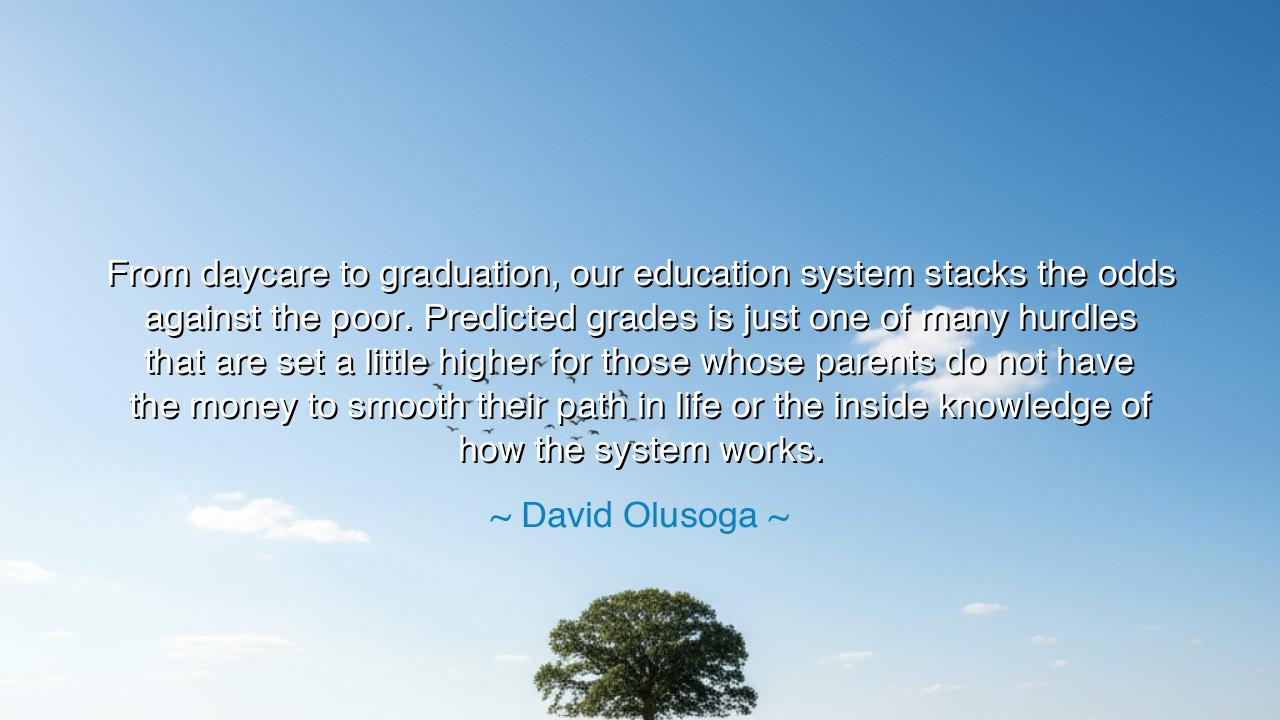
From daycare to graduation, our education system stacks the odds
From daycare to graduation, our education system stacks the odds against the poor. Predicted grades is just one of many hurdles that are set a little higher for those whose parents do not have the money to smooth their path in life or the inside knowledge of how the system works.






The historian and broadcaster David Olusoga, known for his fearless insight into inequality and history’s unspoken truths, once declared: “From daycare to graduation, our education system stacks the odds against the poor. Predicted grades is just one of many hurdles that are set a little higher for those whose parents do not have the money to smooth their path in life or the inside knowledge of how the system works.” This is not merely an observation of policy — it is a lament for justice, and a cry against the quiet architecture of inequality. His words, though born from the present age, echo with the ancient rhythm of truth: that a civilization which neglects its poor in education builds a house upon sand, for no nation can endure when its children rise unequal.
To understand the depth of this quote, one must first see what Olusoga has seen — a world where education, meant to be the ladder of ascent, too often becomes the wall that separates. From the earliest days of daycare, where wealth can buy smaller classes, better nutrition, and more attentive care, the seeds of disparity are sown. By graduation, these seeds have grown into barriers — invisible, yet impenetrable to many. What he calls “predicted grades”, a practice in which teachers estimate a student’s future achievement, is but one example of how a system built to measure merit instead mirrors privilege. Those whose parents possess resources and knowledge find doors gently opened; those without must break them down, often to find they lead nowhere.
His words reveal a fundamental injustice: that the world of learning, which should belong to every child equally, has been quietly colonized by class. The poor are not defeated by lack of talent, but by the invisible machinery that measures potential through the lens of circumstance. This injustice is not new. In Victorian England, the working poor could rarely afford the fees of grammar schools, while the upper classes inherited education as they inherited land. Even today, the ghost of that inequality lives on — cloaked in exams, tuition costs, and the unspoken currency of social capital. Olusoga, as a historian, sees the long line of this continuity — the way oppression changes its language but not its logic.
History offers a mirror to his warning. In the late 19th century, reformers like Horace Mann in America and Raja Ram Mohan Roy in India fought to make education a right, not a privilege. They understood that knowledge is liberation, the single power that can break the cycle of poverty. And yet, despite centuries of progress, the same battle continues. The wealthy still purchase advantage — not only through money, but through networks, tutors, and expectations. The poor still climb uphill, burdened by systemic bias. Thus, Olusoga’s cry is both modern and eternal: that a just society must not merely open its schools to all, but level the ground upon which they stand.
There is also in his words a quiet moral rebuke — not of individuals, but of systems that claim fairness while perpetuating exclusion. The “inside knowledge of how the system works” becomes a kind of secret inheritance, passed from parent to child, while others are left wandering in confusion. It is not malice, but complacency, that sustains this injustice. The educated forget that the map they follow was drawn for them, while others navigate without light. True equality, Olusoga reminds us, is not achieved when the gates are open, but when the path to them is cleared of hidden traps.
The lesson, therefore, is one of vigilance and compassion. If you are a teacher, teach beyond the textbook; if you are a policymaker, remember that equity is not charity but justice; if you are a parent, guide not only your child, but the children who stand without guidance. Education must become not a contest of privilege, but a covenant of humanity. To lift one student from disadvantage is to strengthen the nation’s future; to ignore inequality is to let ignorance rot the roots of civilization itself.
And so, let the words of David Olusoga stand as both mirror and prophecy: “Our education system stacks the odds against the poor.” They are not merely a critique — they are a summons. For every generation must ask itself: what kind of world are we building when talent is lost to poverty, and genius dies unheard? The ancients taught that the measure of a society is how it educates its young. Let us, then, build a world where every child — rich or poor, guided or lost — may stand upon equal ground, and rise by the strength of their mind, not the accident of their birth.






AAdministratorAdministrator
Welcome, honored guests. Please leave a comment, we will respond soon